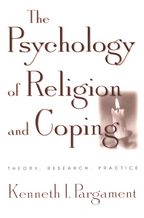Kenneth Pargament, PhD, professor emeritus of psychology at Bowling Green State University, has been on the forefront of the research on religion and resilience, since his initial work in this area undertaken in the 1980s. Professor Pargament has found that there are a number of positive and negative forms of religious coping mechanisms which have a profound and sustained impact on people’s mental health.
“People who made more use of positive religious coping methods had better outcomes than those who struggled with God, their faith or other people about sacred matters” Professor Pargament says.

In his book the Psychology of Religion and Coping, Theory, Research Practice, Pargament explores whether religious belief operates merely as a defence or a form of denial as some are inclined to assert or a positive enabler of positive and needful building blocks for establishing hopeful futures. Professor Pargament’s work builds a much-needed bridge between two different worlds of thought and practice—religion and psychology—and in this book interweaves theory with first-hand accounts, clinical insight, and scientific research. The book underscores the need for greater sensitivity to religion and spirituality in the context of helping relationships, and suggests a range of ways that faith can be deployed more richly to help not only people in crisis, but to indicate ways of communities working with faith scripts to establish more hopeful futures.
Positive and negative aspects of Faith and Religion
What are those positive effects? Research shows that religion can help people cope with adversity through its following qualities:
• Encouraging them to reframe events through a more hopeful lens. Positive religious reframing can help people transcend stressful times by enabling them to see a tragedy as an opportunity to grow closer to a higher power or to improve their lives.
• Fostering a sense of connectedness. Some people see religion as making them part of something larger than themselves. This can happen through prayer or meditation, or through taking part in religious meetings, listening to spiritual music or even walking outside.
• Cultivating connection through rituals. Religious rituals and rites of passage can help people acknowledge that something momentous is taking place. These events often mark the beginning of something, as is the case with weddings, or the end of something, as is the case with funerals. They help guide and sustain people through life’s most difficult transitions.
“It is extremely important that people use their beliefs in a way that makes them feel empowered and hopeful,” says Thomas Plante, PhD, a professor of psychology at Santa Clara University. “Because it can be remarkably helpful in terms of managing stress during times like these.”
Unfortunately, religious beliefs may also undermine healing during stressful times. These negative religious expressions include:
• Feeling punished by God or feeling angry toward a higher being. Trauma and tragedy can challenge conceptions of God as all-loving and protective. As a result, some people struggle in their relationship with God and experience feelings of anger, abandonment or being punished by a higher power.
• Putting it all “in God’s hands.” When people engage in “religious deferral,” they believe God is in charge of their well-being and may not take the necessary steps to protect themselves. One example of this deferral is church leaders who say God will protect their congregations as they hold church services in defiance of physical distancing guidelines aimed at reducing the spread of COVID-19.
• Falling into moral struggles. People can have difficulty squaring their behaviour with their moral and spiritual values. For example, health-care providers who are on the front lines of treating coronavirus patients may describe the anguish they feel as they are being forced to decide how to allocate limited life-sustaining resources, decisions that put them in the uncomfortable role of playing God.
